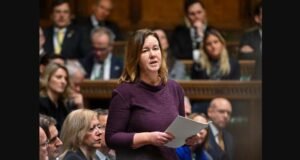
Chancellor Rachel Reeves has decided against raising income tax rates at the Budget later this month.
In recent weeks, Reeves had given strong indications she would increase the rates – a move that would have broken Labour’s election manifesto promise not to raise “the basic, higher or additional rates of income tax”.
However, as first reported in the Financial Times, the chancellor has decided against taking the step, partly due to better-than-expected economic forecasts.
Instead of raising income tax rates, the chancellor could opt to freeze or lower income tax thresholds, the salary levels at which the various rates kick in. Other taxes could also be raised.
Government sources maintain that they are still having to make what they call “tough choices”.
They also stress that the move was not related to the turbulence in recent days relating to the prime minister’s future.
Ahead of every Budget, the chancellor submits its plans to the Office for Budget Responsibility (OBR), which then make forecasts on whether the government will spend more money than it raises and whether the economy will grow or shrink.
The chancellor’s latest measures are believed to have been submitted to the OBR last week.
UK government borrowing costs rose in reaction to reports about income tax rates.
But yields eased through the morning after further reports that the financial hole facing the government was going to be less than experts have been predicting.
Chancellors never comment publicly on what will be in their Budgets but they do prepare the ground – also known as “pitch rolling” – for any big changes that might be coming.
And in the months running up to this year’s financial statement, Labour ministers have repeatedly given strong indications that income tax rates would go up.
In October, the prime minister declined to repeat his previous promises not to increase key taxes, despite being asked to do so by Conservative leader Kemi Badenoch at Prime Minister’s Questions.
Earlier this month, Reeves took the unusual step of making a pre-Budget speech to warn about the need for “necessary choices” and said everyone would have to “contribute”.
And on Monday, she told BBC Radio 5 live: “It would, of course be possible to stick with the manifesto commitments, but that would require things like deep cuts in capital spending.”
If the chancellor has decided not to increase income tax rates, she will have to explore other ways to raise money, in order to meet her self-imposed rules on debt and borrowing while filling a hole in the public finances of around £20bn.
She could still opt to extend a freeze on income tax and National Insurance (NI) thresholds. The freeze was introduced in April 2023 and had been due to expire in 2028.
That would mean as salaries rise more people would be pulled above the income threshold at which they either start paying tax and NI or qualify for higher tax rates.
The Institute for Fiscal Studies estimates extending the freeze by two years could raise £8.3bn a year and would mean someone on the minimum wage would be liable to pay income tax if they worked just 18 hours a week.
Another option would be to lower the thresholds which would raise more money than simply extending the freeze.
There have been reports the Treasury is also considering other measures including a new tax on electric vehicles and higher taxes on gambling companies.
In its 2024 general election manifesto, Labour promised that it would “not increase taxes on working people, which is why we will not increase National Insurance, the basic, higher or additional rates of income tax, or VAT”.
Breaking the manifesto promise would mean difficult questions for Labour ministers and MPs ahead of elections in Scotland, Wales and England.
At the start of the month, the party’s newly-elected deputy leader Lucy Powell, said: “It is really important we stand by the promises that we were elected on and that we do what we said we would do.”
Health Secretary Wes Streeting said it was “really important that we keep our promises and that we stand by our manifesto”.
He added that talk about tax rises demonstrated how “challenging” the situation in public finances was, but that it was “wise to stop speculating” and “wait for the Budget”.
Kemi Badenoch said: “One retreat doesn’t fix a Budget built on broken promises.
“Reeves must guarantee no new taxes on work, businesses, homes or pensions – and she should go further by abolishing stamp duty.”
Liberal Democrat Business spokeswoman Sarah Olney said: “The chancellor gave a press conference to trail her income tax hikes.
“She must come before the British public today, unroll that particular pitch and come clean on what on earth is going on at the Treasury.”
The SNP social justice secretary, Shirley-Anne Somerville, said the UK government was in “complete disarray”.
A Treasury spokesperson said: “We do not comment on speculation around changes to tax outside of fiscal events.”
They added: “The chancellor will deliver a Budget that takes the fair choices to build strong foundations to secure Britain’s future.”
 Weekly Bangla Mirror | Bangla Mirror, Bangladeshi news in UK, bangla mirror news
Weekly Bangla Mirror | Bangla Mirror, Bangladeshi news in UK, bangla mirror news







